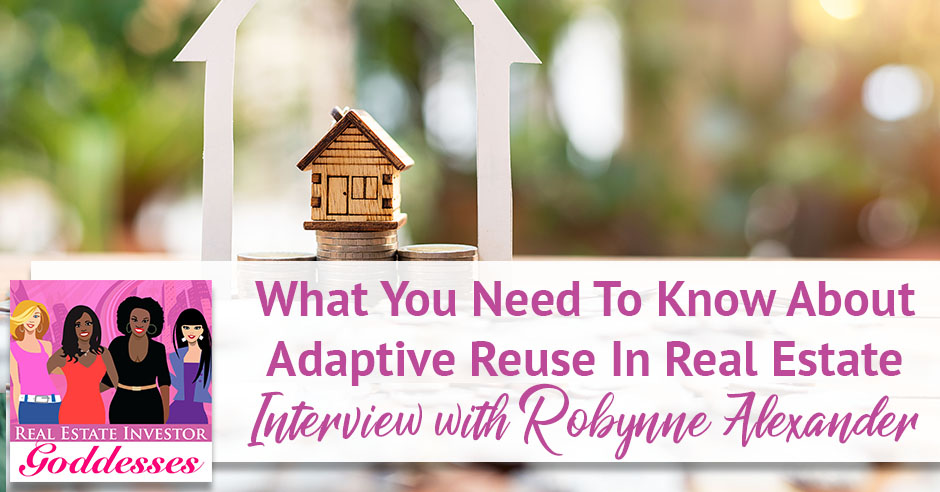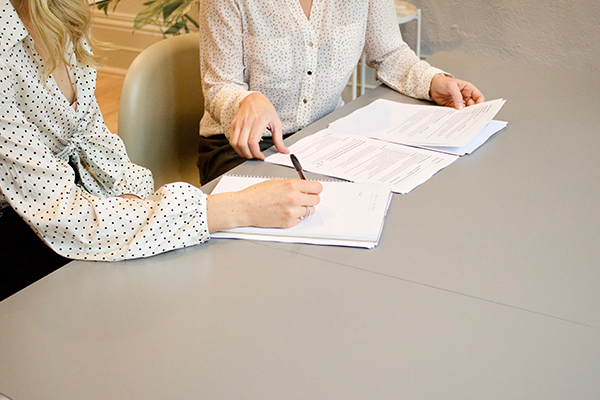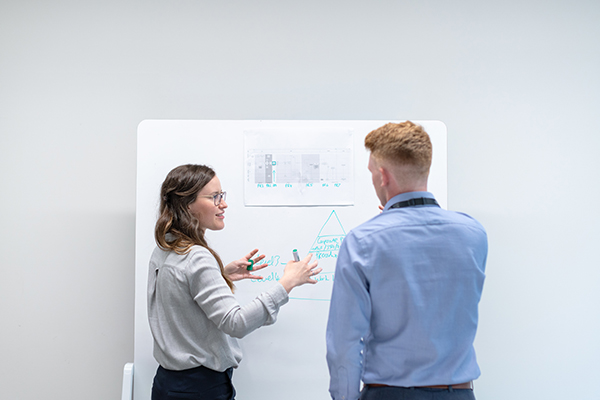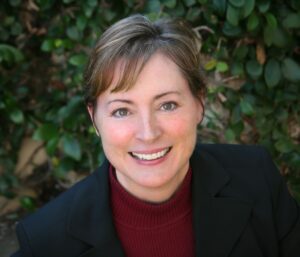
Did you know that you can make money by taking an old unused building and turning it into a liveable space? That’s what adaptive reuse is all about! Robynne Alexander of Infinite Equities Group, LLC is a real estate investor, an adaptive reuse developer, and a beloved mentor here at Real Estate Investor Goddesses. In this episode, she joins Monick Halm to discuss the benefits of adaptive reuse and real estate redevelopment. As a veteran in the field, Robynne shares valuable insight and offers advice on dos and don’ts when managing a deal. Keep your ears glued for more real estate advice to help you on your way to becoming an REI goddess today!
—
Watch the episode here
Listen to the podcast here
What You Need To Know About Adaptive Reuse In Real Estate With Robynne Alexander
On this show, we interview amazing badass real estate investing goddesses, women that are crushing it in the real estate investing space. I am so excited to bring you Robynne Alexander, who is not only one of the most badass amazing investors ever. She also is part of our real estate investor goddesses family, which I’m so excited about. She coaches our inner circle goddesses, teaches and trains in our Wealthy Goddesses Program and is bananas amazing. She’s been investing in real estate since 1993 when she did her first fix and flip. In 2002, she began working as a real estate agent full-time and then as a broker.
In 2006, after completing her CCIM education for commercial brokering, she moved into the apartment sector full-time. She has approximately 150,000 square feet of apartment space totaling a little more than $31 million in assets under management, multifamily and mixed-use real estate. She has developed the unique skillset to find, negotiate, renovate and resell adaptive reuse in value-add properties, which she uses to consistently provide strong returns to her investors. She’s an amazing mentor and coach, providing profound transformations for our goddesses and others. I’m so excited to have you, Robynne. Welcome.
Thank you so much, Monick. That was quite the intro.
I feel like I’ve undersold too. Our goddesses are always like, “I want to be Robynne when I grow up.” You’re amazing. You got started back in 1993. What made you get started in real estate?
Back then, I was in the electrical engineering world and that was a 9:00 to 5:00 job. I’ve always had an interest in real estate. It seemed like it was a pretty natural thing to buy a piece of property, make it better and then sell it. It was way before any of the DIY shows or any of the popular knowledge that everybody has on that. It spoke to me, so I did it. I had my Journeyman’s Degree in Architecture. That probably promoted a little bit of the fascination as well.
That was well before the flips and flops and all the HGTV shows. You were a pioneer in that field. You’ve moved over and mostly in multifamily doing adaptive reuse. Tell us a little bit about what that is.
Adaptive reuse is when you find a property that was built for one particular function and it’s outlived that usefulness. I take those buildings and convert them into apartments. Sometimes it has a mixed-use component where we have retail on the first floor if it’s in a central business district, that type of a thing. Otherwise, we put regular apartments in there with no retail. The other thing that we do is the value-add opportunity, value-add component, where we take apartments that are in poor condition and then we give them a lot of TLC. We have a fifteen-month system that goes through the entire process of renovating it so that we get the maximum benefit for our tenants and also for us.
I love this concept of adaptive reuse, especially because a lot of multifamilies are so expensive and very overpriced. Inventory is limited. Going and finding things that are not multifamily. Tell us a little bit more about how you find these opportunities for adaptive reuse.
There’s no right or wrong in real estate investing. There’s just degrees of profitability. Share on XA lot of times, I call it driving for dollars. I’m driving down the main street and I see a building that looks like it needs some TLC. Maybe it’s closed or used to be a retail center or an office building, something like that. If it looks like something that would fit with the highest and best use of apartments, then I make note if the address, track down the owner and asked them if they would consider selling. Especially post-pandemic, there are so many phenomenal opportunities in office retail and hotels for converting those into apartments.
It’s very lucrative and pretty easy to do once you know how to do it properly. Trust me, I’ve made all the mistakes. We almost always have a waitlist before the projects are finished because there’s such a housing shortage in most of the areas where we invest that people are clamoring for more space, especially if it’s closer to downtown.
Speaking of mistakes, you made a few. Mistakes are super valuable because we learn a lot more from when things don’t go according to plan or what we thought than when they do. What would you say was your biggest mistake? What did you learn from it?
There’s been a little lot of different mistakes that I’ve made from selecting the wrong team. When I say team, I’m talking about the contractor and the architect, especially on adaptive reuse. Having the right team is going to expedite the success of the project. Having the wrong team is going to drag it out. It’s going to give you a lot of learning opportunities when you select the wrong team.
For example, I had selected an architect that wanted to be paid by a percentage of the completed job. I said, “That’s not in alignment of interest. In fact, that is a dichotomy of interests.” That means that the more expensive the build is, the more money the architect gets paid as opposed to trying to constrain the budget and keeping it in terms of what it needed to be. That’s a mistake that you can make.
Having an architect that won’t release the intellectual property, meaning they won’t release your drawings if you choose to hire another architect is another mistake I’ve made. That one, I had to go to court and get a court order to have them released to me. In my first syndication, I did not do the communication with my investors like I should have done. That was a huge mistake for me. I’ve made so many mistakes, Monick. I can’t even tell you but that’s one of the reasons why I’m sport.
After many years of investing, you’ll have those kinds of learning opportunities that show up. You become smarter and smarter and a better and better investor.
The biggest lesson that I learned is to make sure that you have your systems in place for doing these deals, have a good line of communication with the investors that you have, have great communication with your team and hire the right team.

Adaptive Reuse: To reuse is when you find a property that was built for one particular function, and it’s outlived that usefulness.
This is a team sport for sure. Having the wrong team, my biggest mistakes too, probably lie in that area. On the flip side, what are you most proud of?
I’m most proud of not giving up when the going gets rough, being able to be resourceful and find the solutions when you have challenges. There’s always a challenge in every single project that we’ve ever done. Being able to find solutions for it that work is pretty good. I’m proud of being resilient and resourceful. I’m also proud that I was courageous enough to go from playing at this level to pushing myself to play at this level way up here. That was scary.
One of the things that I learned is it’s a matter of more dollars and more commas in the deal. Making sure that you do the worst-case analysis to protect myself is important. The systems that I’ve created as a result of going through what I’ve gone through and then breaking through the different levels of plateaus, I’m pleased about that.
What did this level look like for you? What is this level now? What did it take to mentally find the courage to do that?
Playing way down here was more of the single-family fix and flips, the little baby commercial apartments, the 4, 5, 6, 7 units, fixing and flipping those. Those were pretty small, comparatively speaking to where I am. I knew I had the ability to do it. I knew I was smart enough to do it. I was just terrified to do it because instead of working in the $500,000 to $1.5 million, maybe $2 million mark, I was moving into $10 million, $15 million, $20 million, $40 million.
I put a bid on a portfolio that was up at auction. The bid that I put in was $48 million. It still catches my breath when I think about the numbers but I also know that I’m well protected because of the due diligence and the systems putting in place to do the worst-case analytics that helped to protect me. I coined a phrase a long time ago that there’s no right or wrong in real estate investing. There are just degrees of profitability. For me, when I’m not being as smart as I should be, then my profitability is going to go down. When I’m being smart and doing my worst-case analytics, then my profitability is going to go up.
To what do you attribute your success?
I’m going to say tenacity because I knew I could do it. I wanted to do it. A long time ago, I learned that the super uber-wealthy people, most of them made their legacy through real estate investing because they understood how money worked, real estate and the internal revenue code. They knew how to apply it. Once they learned it, they kept it within their own families. They didn’t share it. I made it my personal mission years and years ago to find out what they know, how they did it and then share it.
Get the education and then go out there and apply it. Share on XOne of the reasons why I love coaching and mentoring so much is because this is very doable. I started coaching back in 2006 and I realized for me to be able to coach people through this, I better be able to put my money where my mouth is. I better take my game to the next level. That’s exactly what I did. I went to the next level. I was terrified but I did it. I made a lot of mistakes. I lost a couple of dollars here and there but by and large, I made it through. I’m very pleased about that.
I’m so pleased that you were sharing your hard-earned wisdom with our real estate investor goddesses. What advice do you have for a woman who’s starting out in this field?
Believe in yourself, get the education and then go out there and apply the education. If all you’re doing is getting educated and not applying it, that’s going to be expensive entertainment. Get out there. Learn how to evaluate deals and evaluate correctly. Learn the vocabulary of this industry. Don’t be afraid to make mistakes, ask questions and say, “I don’t know how to do this.” Be brave to reach out. We’ve got a great network of amazing women that can help you out. Be fearless, get out there and do it. Make sure you lean into the network of professionals that you have at your reach.
What do you wish you’d known at the beginning that you now know?
If I knew then what I know now, I would have gotten into big commercial deals way back then. It’s a lot easier to do the bigger deals. It’s terrifying when you first get into it. I get that. They are easier to do than the little small ones. The reward is so much bigger. Not just in terms of the profitability but in general, being able to beautify a community, provide well-built safe apartments that tenants can take pride in and at an affordable price. I love doing that. The fact that I get a good profit as a result of that, I’m good with that.
That’s something that I wish I had known earlier too. I don’t know if it’s easier to go big than it is to go small but it’s definitely not harder. It’s just different. The rewards are so much more. For pretty much the same amount of effort, you’re getting a lot more bang for your buck.
I worked just as hard on this adaptive reuse as I did on the single-family fix and flip but I get a lot more reward from the adaptive reuse than I did from the single-family fix and flip.
In certain ways, you do have things that are open and more able to access. With the financing, doing a 1 to 4-unit, it’s based off of your personal capital and credit. I’m able to get a $20 million, $30 million loan by myself but I have a hard time refinancing my own house because of all the tax benefits of real estate. My taxes don’t look like I make that much money. We have money in the bank to buy it all in cash but it can be hard to qualify for those 1 to 4 units. Once I learned about commercial, I was like, “I wish I had known about this so much earlier and been into this before.”

Adaptive Reuse: When you’re not being as smart as you should be, your profitability is going to go down. When you’re being smart and doing your worst-case analytics then your profitability is going to go up.
We are going to get into our famed end of show trinity but before we do that, what is the best way for people to find out more about what you do? You can go to REI Goddesses and become part of our Wealth Goddess Program. You get to work with Robynne, train or learn from her. Where else can they find you?
They can go to my website, I suppose, InfiniteEquitiesGroup.com. They could call me or email me. They can find me on Facebook, certainly.
You can email at [email protected]. It’s time for our trinity, which is a brag, gratitude and a desire. What is one thing you’re celebrating? What’s your brag?
We moved into a brand-new office and it’s beautiful. We have boxes and everything everywhere but we moved in, which means all of my staff are under one roof. We’re coming together in a much higher, more professional manner. We used to all work out of our homes. That was much easier to do with COVID but we have a lot more projects going on. We have four under contract. We need to have them under the same roof, at least a couple of days out of the week. I’m celebrating that. It was huge. I never thought I would go into an office but we are.
What is one thing you’re grateful for?
I’m grateful for my life, my health and my brain because my brain is, in my opinion, my single best strongest asset. I’m so grateful that it’s working.
Last but not least, what is one thing you desire?
I desire some time off so I could go to Europe for about a month to relax for a little while.

Adaptive Reuse: If all you’re doing is getting educated and not applying it, that’s going to be really expensive entertainment.
It’s so shall your desire be or so much better than you can imagine.
Thank you.
Thank you so much for your time and for being a part of the show. You are invaluable. We all love you so much.
Thank you. We love you. All the goddesses on the show and stuff, I appreciate them. I’m having so much fun. Thank you for letting me be a part of the group.
It’s our pleasure. Thanks for reading. If you don’t want to miss another one of these, make sure you subscribe. Also, go and please rate it. Give us five stars. Share with your friends. Be with us next time for another interview.
Important links
- Robynne Alexander
- Wealthy Goddesses Program
- Facebook – Robynne Alexander
- [email protected]
About Robynne Alexander
 Robynne did her first fix & flip in 1993. In 2002 she began working in real estate full-time as an agent then as a Broker. In 2006 after completing her CCIM education, she moved in to the apartment sector full-time. She currently has approximately 150,000 square feet totaling a little more than $31 million in assets under management (AUM), in multifamily and mixed-use real estate investments. Robynne has developed the unique skill set to find, negotiate, renovate and resell adaptive reuse and value add properties providing consistently strong returns for her investors. As a mentor and coach she loves facilitating profound transformation with her students.
Robynne did her first fix & flip in 1993. In 2002 she began working in real estate full-time as an agent then as a Broker. In 2006 after completing her CCIM education, she moved in to the apartment sector full-time. She currently has approximately 150,000 square feet totaling a little more than $31 million in assets under management (AUM), in multifamily and mixed-use real estate investments. Robynne has developed the unique skill set to find, negotiate, renovate and resell adaptive reuse and value add properties providing consistently strong returns for her investors. As a mentor and coach she loves facilitating profound transformation with her students.
Love the show? Subscribe, rate, review, and share!
Join the Real Estate Investor Goddesses Community today:





